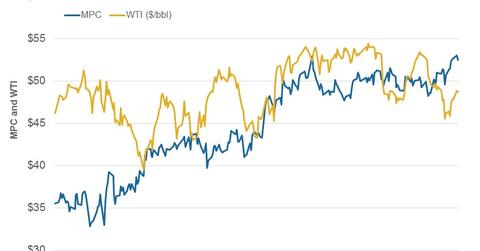How Does MPC Stock Correlate with WTI?
Marathon Petroleum’s correlation with WTI stands at 0.34. This value shows that the two have a positive but relatively weak correlation.
May 23 2017, Updated 10:36 a.m. ET

Correlation coefficient
In this series, we’ve examined Marathon Petroleum’s (MPC) stock performance, dividend yield, PEG ratio, valuations, beta, analyst ratings, short interest, institutional holdings, and implied volatility. In this article, we’ll examine the correlation between MPC stock and crude oil.
A correlation coefficient shows the relationship between two variables. A correlation coefficient value of 0 to 1 shows a positive correlation, 0 shows no correlation, and -1 to 0 shows an inverse correlation. We’ve considered 12 months’ worth of price history for Marathon Petroleum and WTI (West Texas Intermediate).
MPC’s stock correlates positively with WTI
Marathon Petroleum’s correlation with WTI stands at 0.34. This value shows that the two have a positive but relatively weak correlation. Marathon Petroleum stock moves in line with WTI prices only to a certain extent. Changes in oil prices can explain ~34% of the movements in MPC’s stock price.
Peer correlation analysis
The scenario is similar for MPC’s peer Tesoro (TSO). TSO’s correlation with WTI stands at 0.23. Comparatively, the same correlation is feeble for Valero Energy (VLO) at 0.08. Other downstream players Delek US Holdings (DK) and Phillips 66 (PSX) have higher correlations with WTI at 0.34 and 0.42, respectively.
Integrated energy companies tend to have higher correlations with crude oil than downstream companies. Suncor Energy (SU), an integrated energy giant, has a 0.65 correlation with WTI, likely due to rising oil prices. Upstream earnings, which are affected by oil prices, contribute a substantial portion of integrated energy companies’ earnings.
If you’re looking for exposure to downstream stocks, you can consider the iShares North American Natural Resources ETF (IGE). The ETF has ~7% exposure to refining sector stocks.
